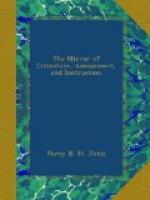“What time the shepherd, blowing
of his nails,
Can neither call it perfect day nor night?”
“Patience!” I think I hear some of my fair readers exclaim, “Is this the early rising this new correspondent of the MIRROR means to enforce? Drag us from our beds at peep of day! The visionary barbarian! Why, ferocious as our Innovator is, he would just as soon drag a tigress from her’s! We will not obey this self-appointed Dictator!” Stay, gentle ladies; in the first place I am not going to enforce this or any other hour; in the second place, I am not going to enforce early rising at all.—Convinced you feel, with me, the importance of time, and your responsibility for its right improvement, I leave it to your consciences whether any part of it should be uselessly squandered in your beds. The moral culpability of late rising is when it interferes with the necessary duties of the day; and though, my fair readers, you may in a great measure claim exemption from these, I would still, simply in reference to your health and complexions, advise you not to exceed seven o’clock. But, to effect this, a sine qua non is, retiring early, say at eleven—(though really I am too liberal.)—When people were compelled to retire at the sound of the curfew, when
“The curfew toll’d the parting knell of day,”
early rising was a necessary consequence, as they were earlier tired of their beds; and this may account for the singular difference between ancient and modern times in this respect; so that late rising, though a modern refinement, is by no means exclusively attributable to modern luxury and indolence, but partly to a change of political enactments, (you see, ladies, I am giving you every chance.)
In the man of business, late rising is perfectly detestable; but to him, instead of the arguments of health and moral responsibility for time, (or rather in addition to these arguments,) I would urge the argumentum ad crumenam; which is so pithily, however homelily, expressed in these two proverbs, which he cannot be reminded of once too often:
“Early to bed, and early to rise,
Will make a man healthy, wealthy, and
wise.”
“There are no gains without pains;
Then plough deep, while sluggards sleep.”
And a third proverb is a compendium of my advice to both classes of readers:
“He who will thrive must rise at
five;
He who has thriven may sleep till seven.”
So then we have defined what early rising is; seven, to those who have nothing to do,—as soon as ever business calls, to those who have. Was ever bed of sloth more eloquently reprobated than in the following lines from the Seasons?
“Falsely luxurious will not man
awake,
And, springing from the bed of sloth,
enjoy
The cool, the fragrant, and the silent
hour,
To meditation due and sacred song?
For is there aught in sleep can charm
the wise?




